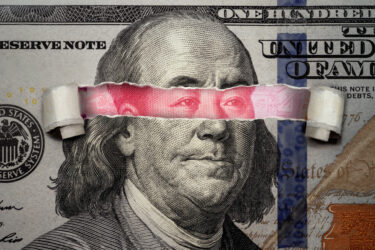Debunking a Major Market Myth About the Dollar
Robert Ross|November 13, 2023

As someone who has built a large online following… I can say that nothing ticks me off more than seeing “analysts” take charts and data out of context to deliberately scare their readers into believing their point of view.
After all, fake news spreads 10 times faster than real news. It gets clicks… and generates revenue.
But there’s one piece of fake news I keep seeing that needs to be debunked.
And it’s the “proof” that the world is turning against the U.S. dollar because countries are dumping U.S. government bonds.
We Can Work It Out
Foreign countries – particularly China – hold trillions in U.S. government bonds.
This is a mutually beneficial relationship. China sells a lot of products to the U.S., so it earns a lot of U.S. dollars. Instead of keeping all those dollars in cash, the Chinese invest some in U.S. government bonds, allowing them to collect interest on the money they’ve earned.
It’s also a safe way for countries to maintain their foreign exchange reserves. Say you have some extra money and want to keep it safe. Most people would put it in a bank. China’s government does something similar… but instead of holding its excess cash in a bank, it holds that money in U.S. government bonds.
China does this because U.S. government bonds are considered one of the safest investments globally. They’re a safe haven for money. So China puts some of its wealth into these bonds to make sure it doesn’t lose value.
By holding U.S. government bonds, China can keep its money safe, earn some interest and also help the U.S. government fund its operations.
And now, many “analysts” are claiming China is dumping its U.S. government bonds.
False.
“De-Dollarization” Isn’t Based in Reality
I won’t name any publication specifically.
But many so-called analysts are either confused about how to read data or deliberately misleading their audience to spread doom and gloom.
For instance, one chart I’ve seen floating around is this one about China…

Sure looks like China is dumping its U.S. government bonds, doesn’t it?
But that’s not the case – for two reasons. While it’s true China is buying fewer Treasurys than in years past, it’s actually holding more U.S. debt than ever.
How does this make sense? Well, there are many types of U.S. government debt, including Treasurys and something called “agency debt.”
See, Treasurys are issued by the U.S. Department of the Treasury on behalf of the federal government. They are considered the safest form of debt because they are backed by the full faith and credit of the U.S. government.
Agency debt, on the other hand, is issued by government-sponsored entities such as Fannie Mae, Freddie Mac and Ginnie Mae. While these agencies have a degree of government support, their debt is not as explicitly guaranteed as U.S. Treasurys.
Yet they are still U.S. assets. And when you include agency debt in China’s debt calculation, there has been little change in its holdings since 2015.
But the failure to consider agency debt is not the only reason you see charts like the one above.
The Worst Bond Bear Market in U.S. History
The chart above shows only the total value of China’s U.S. Treasury holdings.
Yes, it’s true that China that has shifted away from holding Treasurys, instead favoring agency bonds.
Yet if you look closer, you’ll notice that the y-axis of the chart above is labeled “trillions of dollars.” That means it shows not the total number of Treasurys held by China, but rather the value of those bonds.
And considering we’re currently in the worst bond bear market in U.S. history…
It makes sense that the value of China’s Treasury debt is falling. The same logic can be applied to charts that show how much U.S.-denominated debt Saudi Arabia, Japan and other countries hold.
The truth is… U.S.-denominated assets still dominate the global picture. Until the dollar loses its status as the world’s reserve currency, that will remain the case.
And I don’t see that happening anytime soon.



